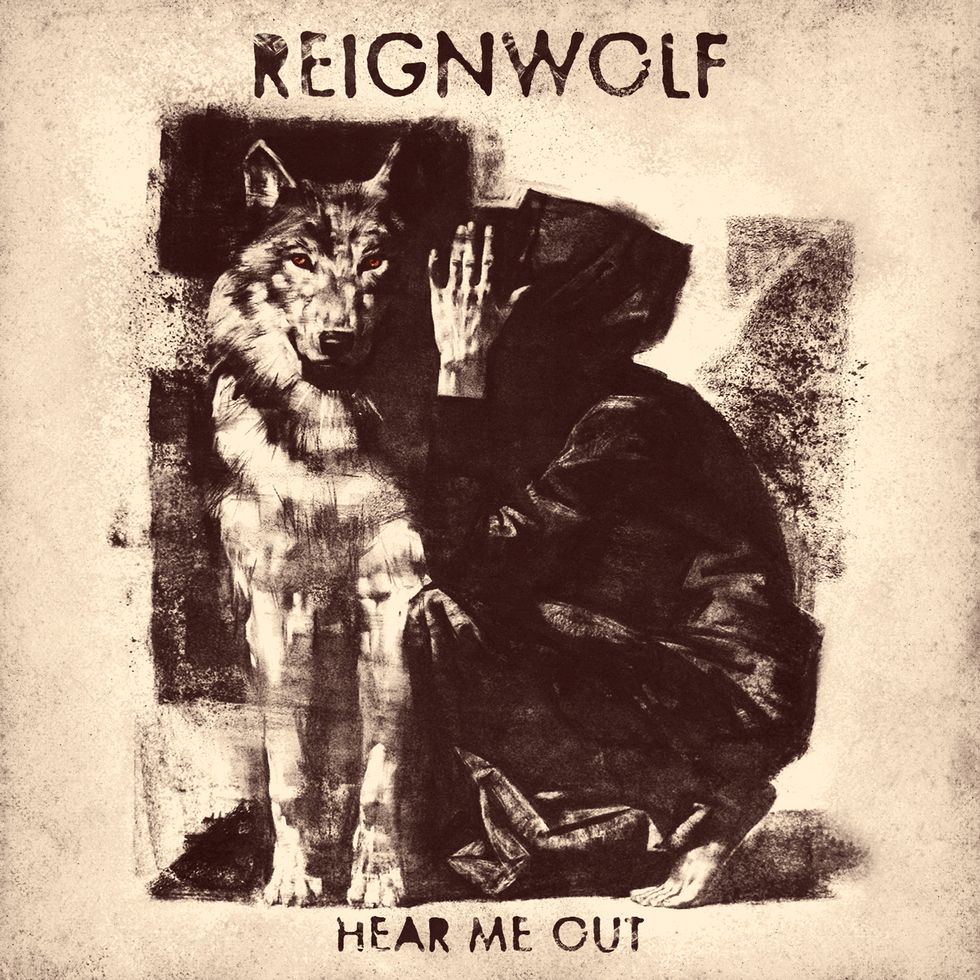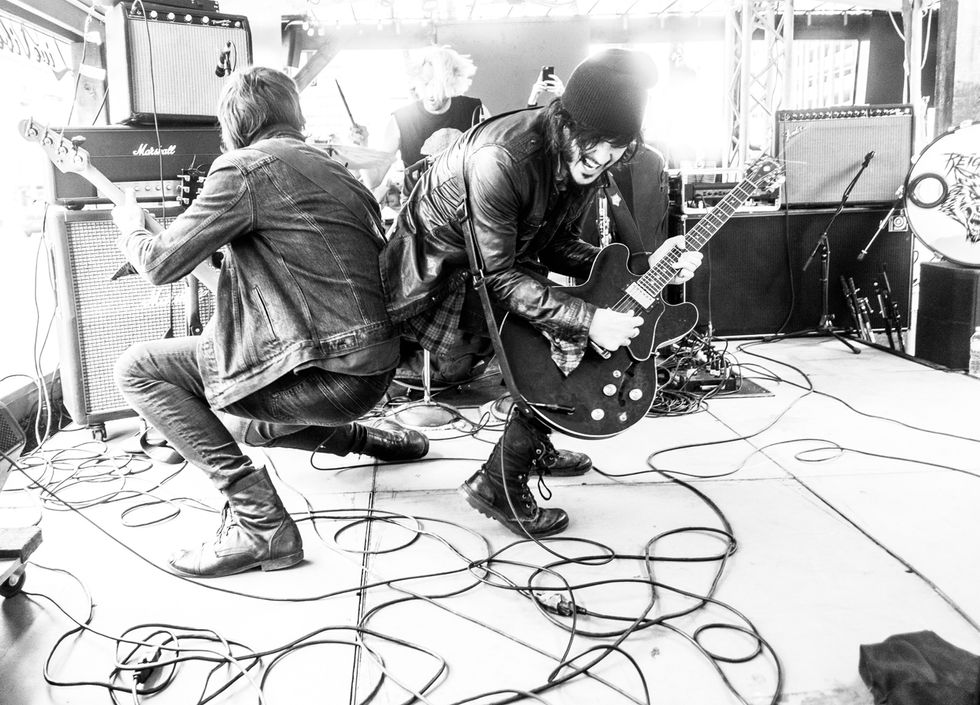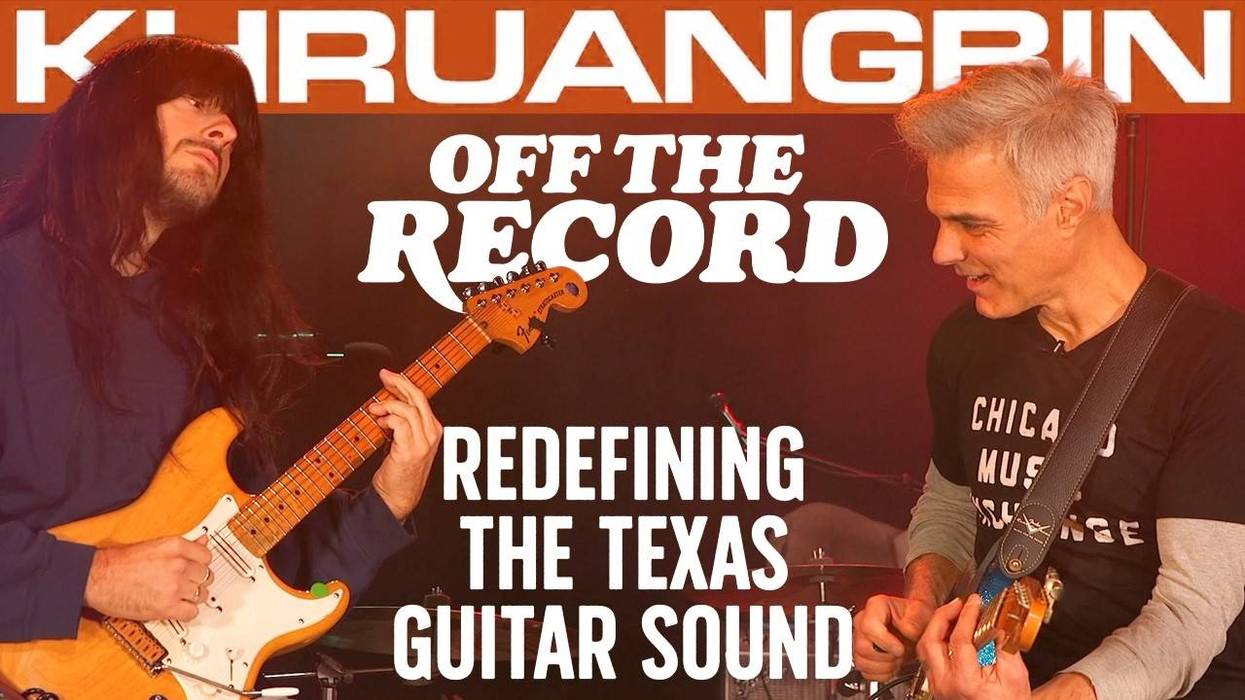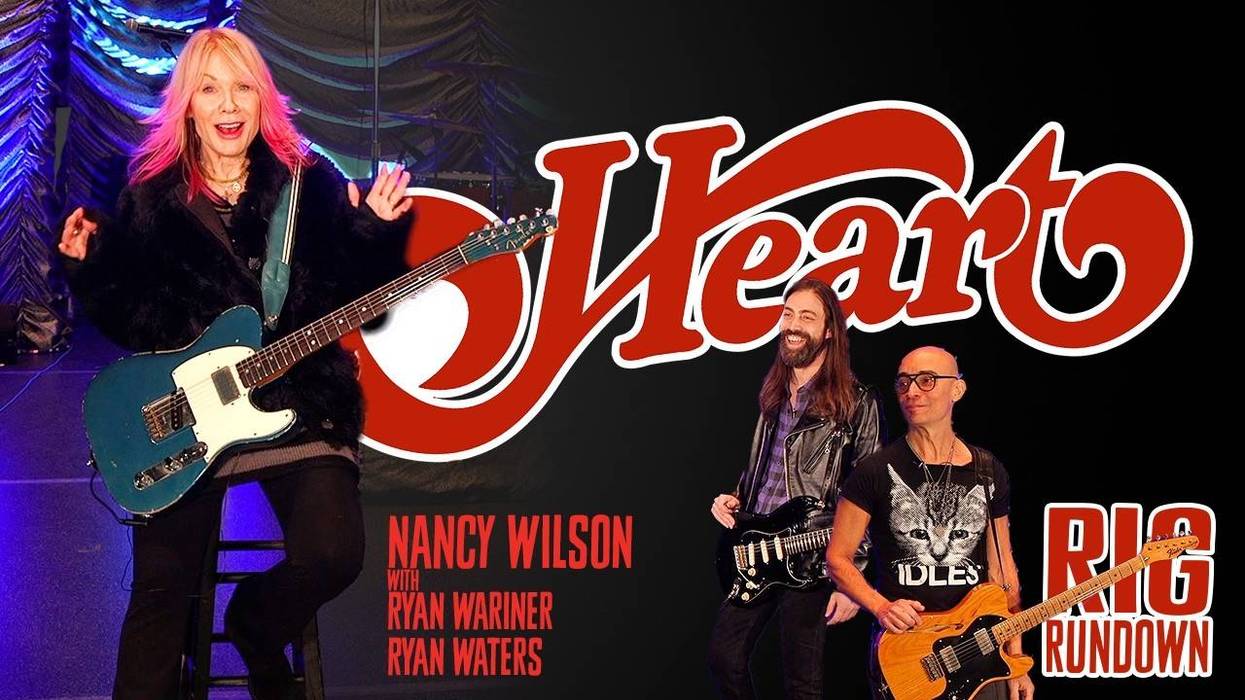Jordan Cook is used to getting a little beaten up on tour. The Reignwolf singer and guitarist has developed a penchant for stage diving and crowd work, establishing a roughhouse reputation that sometimes catches up to him. During the band’s stint at this year’s South by Southwest, a few days before our interview, things got extra crazy and Cook fell from stage during his third show of the day. “At SXSW, it’s normal to do two or three shows a day and, with our types of shows, that’s not normal,” he explains. While it took him a few days to recover, he was quick to say he just needed to “shake it off” and to talk about his next jaunt on the road.
Reignwolf’s rough-and-tumble live performances have, until now, been the primary way that fans could hear the band. Since creating Reignwolf in Seattle in 2012, Cook has intentionally held back on recording a full-length album, preferring to release a few singles, play live, and let videos of those performances do most of the work in spreading the word. While it may seem like an unusual approach to take in 2019, the band’s stints touring as a supporting act for mega-bands like Pixies and Black Sabbath prove that Cook is onto something.
While he makes sure to credit drummer Joseph Braley as being part of the band since the beginning, Cook has also used Reignwolf as a solo act at times, playing guitar and singing while jamming along with a kick drum. For the hard-rocking Hear Me Out, Reignwolf’s long-awaited full-length effort, the band is now a focused power trio. Joined by Braley and bassist S.J. Kardash, Hear Me Out douses Cook’s bluesy rock ’n’ roll with heavy grunge-rock vibes, aided by contributions of big-name mixing engineers with heavy alternative rock credits, such as Tchad Blake (Pearl Jam, U2, the Black Keys), Mario Caldato Jr. aka Mario C (Beastie Boys), Vance Powell (the White Stripes), and Tony Hoffer (Beck). Songs like the opening “Black and Red” and “Ritual” allude to Cook’s early years in Canada as a teenage blues-guitar prodigy, while more prominently focusing on his love of ’90s rock and heavy-hitting hard rock.
With Hear Me Out finally released into the world, Cook is taking Reignwolf’s music to greater heights but he’s still beating himself up in front of audiences. Once he recovered from SXSW, we caught up with Cook to discuss topics spanning Reignwolf’s live shows, Cook’s gear, and a shelved collaboration with the Soundgarden rhythm section.
You fell off a stage the other night?
Yeah! That happened in Texas. It was our third show of the day. That isn’t my first time falling off a stage. It’s one of those things, you gotta get up and keep going.

Jordan Cook chose an impressive lineup of producers to work on his debut album, including Tchad Blake (Pearl Jam, U2), Mario Caldato Jr. (Beastie Boys), Vance Powell (the White Stripes), and Tony Hoffer (Beck).
I was up on some speakers and, as I was going down, there was a speaker below and there was this little crack and that’s where my foot went into. I was just like, “No way. We got through all of this and that happened!?” But it’s all good.
Judging from YouTube videos, it seems like you stage dive, or at least end up in the audience, pretty regularly. Have you had any related accidents?
Luckily, I don’t think so. The other night, I was in the crowd a little bit and somebody lifted me and they were carrying me. When they lifted me up, they were pulling down my pants. I don’t think the guy was trying to do that, I think he was trying to get to my guitar and I was pulling away, and he got a knob off of my guitar.
Is that the worst that’s happened to your guitar in these situations?
Yeah. A 335 is more of a breakable guitar, so I guess I’ve been really lucky.
Yeah, you’ve been lucky!
Once when we did Austin City Limits, I did hit a guy by accident with my guitar and I grabbed him right away and said, “Man, whatever you want, we got you. That wasn’t supposed to happen.” He was like, “It’s my birthday. This is the best thing that ever happened to me.” It was the most ridiculous thing because there was blood coming out of his head. It was definitely scary. Our shows get pretty crazy, but there’s not blood coming from the audience usually.
You’ve done a lot of playing as a one-man band and you even toured with Black Sabbath that way. Have you decided to work exclusively with the band now?
When I was touring with Sabbath, Joseph, the drummer, did come for some of the shows, but during that time it was mainly me and a kick drum. I still do that, but there seems to be more of a band energy going on. The bass player, S.J. … we recorded a lot of this record at his home studio in Saskatoon, Saskatchewan, where I was born. He and I have always played music together and it’s a bass-heavy record, so it makes sense for us to expand a bit and have S.J. come out with us. We’ve been playing music together since I was 11 years old. It’s one of those undeniable situations. I don’t know what happens, but when you grow up together, you know absolutely everything each other is about to do. He’s the best bass player I know.
And Joseph Braley has been with you since the beginning?
In 2012, I was in Seattle and Ben Shepherd, the bass player from Soundgarden, introduced me to Joseph. He was kind of joking around and saying, “This guy’s in your band.” We ended up having a jam and it was awesome. That was the start of Reignwolf.
You had previously worked with both Ben Shepherd and Matt Cameron, right?
Yeah, originally Matt Chamberlain [former Pearl Jam drummer who has also subbed for Matt Cameron in Soundgarden] and Ben Shepherd and I were doing stuff in Memphis, and then I went out to Seattle and Matt Cameron offered to help finish the record.
We recorded a bunch of stuff, but I kind of enjoyed not having a record out. It was more special. When you’re getting offers to go out with Pixies or Black Sabbath or any of these bands, not having a record seems badass to me. It kind of led up to this moment, and now the band and I are closer together and we’re getting things like Woodstock.
Was that album ever released?
It’s not released, but I hope that at some point it sees the light of day. We’ll see about that. There’s no doubt we’ll jam again.
Do you think in 2019 it’s still important to release records, versus playing live?
I think it’s upside down and backwards again, because a single will most likely take you farther than an actual record. That being said, it’s also a dream to make a full record that you don’t hate. We put out four singles before this record and we lived off those for quite some time.
I think the live show is more celebrated now than it ever has been, but to be able to have people go home with something and be able to hang onto something is pretty cool. At our merch booth on this past tour, seeing people buy CDs was hilarious to me. CDs, I thought, were something of the past, but people still buy CDs. It’s pretty amazing.
Cook has been playing music with his childhood friend, bassist S.J. Kardash, since age 11, so he asked Kardash to join Reignwolf. The trio is rounded out by drummer Joseph Braley. Photo by A.F. Cortes
How is it different playing the new material live, with the band?
I’ve noticed I’m working harder to get the lyrics right with these songs because people know now, whereas before I could get away with singing whatever feels right.
We’re a bit on the edge right now, because this is the first time we’ve ever played any of these songs. They weren’t live-tested yet, so we’re finding things within them when we’re out playing and it’s just awesome. It’s fresh blood. Every time we play, we don’t play anything quite the same way and that keeps it special.
For example, in “Keeper,” we’ve been extending the ending quite a bit and it’s been so awesome. There’s this really great line underneath that I can solo on and it’s really melodic.
Reignwolf’s Gear
Guitars
Gibson ES-335
1970s Gibson SG
Amps
1950s Fender Champ
Fender Super Reverb
Marshall JMP (50 and 100 watt)
Analog Outfitters Sarge
Strings and Picks
Ernie Ball (.010–.046 and .011–.052 sets)
Dunlop Tortex .73 mm
You co-wrote a lot of the material on the album.
Some of it I just wrote, and a bit with S.J. I also have two English friends, Matt Hales [Aqualung] and Blair MacKichan, that have been in my court for many years and we got together and wrote some stuff. They’re the crazy ones. We came up with that song “Over and Over.” Up until this point, I hadn’t done a lot of co-writing but with these guys it just felt like jamming. I kind of feel like we’re only getting started because there’s quite a bit more music that we’re drafting up.
You grew up as an aspiring blues guitarist. Were you always interested in writing songs?
Writing songs to me is really natural. I really enjoy that. There hasn’t been a lot of thinking about how to go from this to that. It’s just moved the right way.
There are a few different mixing engineers who worked on different songs on this album. What was it like having so many contributors?
I got really lucky to work with Tchad Blake and it turns out he’s a fan, so I sent him some stuff. Whatever he mixed felt badass.
The most surprising one is Mario C. I got to meet Mike D from the Beastie Boys and said, “You gotta tell me who mixed ‘Sabotage.’” “That’s Mario C., man.” He introduced me and we were working together within 24 hours. He came up with the tremolo thing in “Over and Over,” the Byrds-y thing.
Another guy I really enjoyed working with was Tony Hoffer. I’ve never gotten a mix where mix one was done and I didn’t have to say anything back. That’s unbelievable. It’s crazy when somebody gets the vision to the point where they know where to take it and we never even sat in the same room before. He worked on Midnite Vultures—he co-produced it with Beck. He knows what’s up.
There are some great dirty guitar tones. What were you using?
Mainly, it was a lot of dimed amps. That came to be the thing that always got us there. We were working at Snoop Dogg’s old studio, North Dwarf Records [formerly Doggy Style Records]. There’s this engineer there and somebody had lent him this ’50s Champ, and I was like, “That’s the amp.” The first note and I was like, “We might have to record all the guitars right now because this sounds so good.” He had some kind of RAT pedal that he used, but it was mainly just that amp cranked right out.
Did you mostly use your Gibson ES-335?
Yeah, and the other guitar that showed up was my SG. It’s really clean. I can almost get Fender tones with this, so any of the cleaner tones is the SG.
The 335 going through the Champ was amazing and I was also lucky enough to get a ’59 Bassman and I gotta tell you, that thing on full sounded amazing. It didn’t need any pedals; it just had that freak-out sound already. A friend of mine also lent me a 100-watt and a 50-watt Marshall JMP, and I used those on a few things. The 50-watt was super chime-y and the 100-watt just has so much power.
What’s the deal with your 335? You’ve been playing that a while.
I got that one on the Black Sabbath tour. The one that I originally had was in pieces. We were in the U.K. and our drummer was holding it in the case and he stood it up and it fell and hit the ground. We opened the case and the headstock was off. I was super bummed. I got it back to Seattle and had it glued, but it busted three or four more times in different spots. It just wasn’t the same guitar anymore. It sucked because that one sounded really great. It made me really sad because that’s where the whole Reignwolf thing came from—I got that guitar and it was just meant to be.
I went on Craigslist and got my management to buy this guitar and send it to the Barclays Center in New York, and I got it right in time for the show, walking onstage. I’d never played the guitar before, just knew it looked awesome. I’ve been using that one ever since. I’m not sure what year it is, I’m gonna guess it’s an early 2000s Custom Shop. I don’t know what it is, but it’s a special one.
What’s up with your SG?
When I moved to Seattle, I got there and I had no guitar because I’m Canadian and was going over the border and still figuring it out. I went by this studio and picked up the guitar and it was amazing. The guy who owned the studio was like, “How much can you give me for it? I’m going through a divorce and either you get it or my wife gets it.”
I gotta tell you, there’s nothing like an early-’70s SG. It’s so nice. And it’s one of the only ones I’ve ever played that stays in tune. It does the Cream thing really well. That and the ’59 Bassman—it sounds so cool!
When you were younger, you had some really great opportunities, like playing with B.B. King when you were 15, and later on you hooked up with Soundgarden and Pearl Jam. How important has it been to you to work with such iconic influences?
It’s been a bonus. It lets you know you’re on a good track. Meeting Ben Shepherd was the weirdest thing. I was in Memphis recording with Matt Chamberlain and we didn’t have a bass player. On the way to the studio, I was listening to “Burden in My Hand” by Soundgarden and I thought, “That’s the best bass line I’ve heard in many years.” I got to the studio and was like, “Is there any chance you know Ben Shepherd?” And he said, “I can give you his number.”
I just cold-called Ben and he was in the studio in Memphis within 24 hours. After we were done with the sessions, I called my agent and said, “We’ve gotta set up this tour.” Within a month we were out on the road and we did six or seven dates across Canada. It was some of the best shows of my entire life. I’ve got the rhythm section of my heroes! It was just incredible.
When I went to Seattle, I was just going there to hang out with Ben. They had just gotten Soundgarden back together and they were doing a small club show and he invited me and I just didn’t leave. Within a month I was headlining my own shows in Seattle and things were going well. The Pearl Jam camp introduced me to their booking agent and he got us on all the festivals and it’s been an incredible ride.
YouTube It
Watch Reignwolf tear through Hear Me Out’s “Black and Red.” The energy between the band and the audience is palpable and Cook doesn’t miss a note when he grabs the mic with one hand and keeps riffing with the other at 1:45, before soaring into a bend-laden melodic solo at 2:50.



















![Rig Rundown: Russian Circles’ Mike Sullivan [2025]](https://www.premierguitar.com/media-library/youtube.jpg?id=62303631&width=1245&height=700&quality=70&coordinates=0%2C0%2C0%2C0)
















![Rig Rundown: AFI [2025]](https://www.premierguitar.com/media-library/youtube.jpg?id=62064741&width=1245&height=700&quality=70&coordinates=0%2C0%2C0%2C0)











